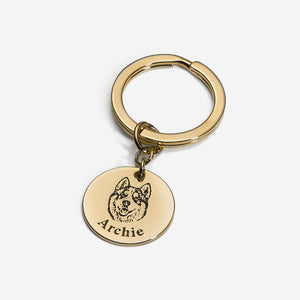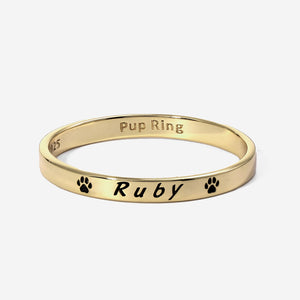In last week’s blog I mentioned that I had taken my dog Cookie for his regular vet checkup. We went in for his yearly checkup and vaccination, and we discovered that he had a bacterial infection in his left ear. Thanks to the care and medicine we were given, as well as the detailed explanation and questions that were answered, Cookie is feeling much healthier and happier! I loved my experience with this vet who cared so much and helped ease both my dog’s anxiety as well as my own, and I want every dog owner to be just as happy and confident when it comes to their pup’s healthcare.
Most people don’t look forward to going to the doctor or the dentist. As for the vet, your pup may love the prospect of going to a new place to meet another dog lover. Or, your dog may absolutely hate going and hide in the corner the whole time your vet is trying to care for them. My dog Cookie is an anxious pup at times, so he falls into the latter category. Whether you’re a new dog owner who is not sure where to start, or an experienced dog wrangler looking for a new veterinarian to care for your pup, we’ve got you covered!
Who should you choose as a vet?
Qualifications- You will probably want to find a vet whose practice is accredited by the American Animal Hospital Association. It is not legally required, but if your vet has this accreditation, it means that they wrought it out on their own and have an ongoing high standard when it comes to the care they provide. Some other signs of a practice that is proud of its high standards is a clean waiting area and friendly staff.
Personality- A vital factor that you should consider with your vet is their personality. You want a vet that is going to be compassionate with your dog and have a way with animals. The worst feeling ever is taking your dog to the vet and getting someone who is impatient and rough with your pup. Cookie and I have only ever had one bad experience with a vet when our normal provider wasn’t available. They were impatient, obviously wanted to get the appointment over with, grabbed Cookie to examine a bump on his face without any notice and care, and scared him so much he peed all over the table. I know that if we were able to see his normal provider, they would have been friendly and welcoming and Cookie would have been comfortable and compliant during the visit. Looking at reviews online may help give you an idea of what vets in your area tend to be the meanest or the nicest.
How do you find the right vet?
 Word of mouth- The best way to find a great vet is to ask other dog lovers for recommendations. They will have firsthand experience with both the vet themselves and the practice where they are located. This will save you a lot of time doing research online, where it may be hit and miss on finding accurate information or honest reviews. Some great people to ask would be your fellow pup parents, trainers, groomers, breeders, shelters- anyone that you know who has a great interest in giving the best life possible to the dogs they care for!
Word of mouth- The best way to find a great vet is to ask other dog lovers for recommendations. They will have firsthand experience with both the vet themselves and the practice where they are located. This will save you a lot of time doing research online, where it may be hit and miss on finding accurate information or honest reviews. Some great people to ask would be your fellow pup parents, trainers, groomers, breeders, shelters- anyone that you know who has a great interest in giving the best life possible to the dogs they care for!
Searching online- If you can’t get any recommendations for a good vet in your area, you can search online for veterinary practices and reviews. Be discerning when it comes to what you see others posting and where you get your information- sometimes a negative review is someone nitpicking unimportant details, and other times a clear and thoughtful review can tell you everything you need to know about a vet. You can also try calling any practices you are interested in to ask questions about the care and services they provide, as well as costs for things like appointments, vaccines, and other types of care.
When should you see your vet?
Check hours- You should be aware of your vet’s hours so that, in the event of an emergency, you know who will be available when you call for help. You should also look for an emergency vet in the area that will be open any hours your normal vet may not be available. Then, if something ever happens, you are confident that you know who to call and where to go.
First check-up- The first time you bring your pup to the vet, feel free to ask as many questions as you like. A good vet will be willing to answer any questions you may have about your dog and its health. Ask any questions you may have about your dog’s care and health. You should also ask questions about things like what services they have available- do they do tests on site? Do they monitor pets that stay overnight? Do they offer any extra services such as boarding or grooming? Having a vet that is willing to communicate with you is important when it comes to quality care.
Yearly check up/vaccines- Vaccines will prevent your dog from catching serious illnesses such as distemper, blebleh. You’ll likely also want to opt for a yearly kennel cough vaccine. Kennel cough can spread between dogs that are being boarded or placed in daycare, and many of these facilities will require your dog to be vaccinated in order to attend.
You’ll also want to take your dog in regularly for a yearly check-up. It’s easy to have your check-up and vaccines done at the same time. You should bring up any health concerns you have with your vet. Even if it seems silly or minor, you may find that the small thing that you noticed reveals a more important underlying problem, and by catching problems early on you can help your pup get ahead of things like illnesses, infections, or generally uncomfortable conditions such as allergies.
 Emergencies - Be sure to figure out your vet’s hour. Some practices will be open just during the day during the week, so you will want to have one or two vets in your area that you know that you can go to in an emergency. Having an emergency vet picked ahead of time will help you make sure your pup gets the best care available in the event that an accident happens or your pup wakes up very sick in the middle of the night.
Emergencies - Be sure to figure out your vet’s hour. Some practices will be open just during the day during the week, so you will want to have one or two vets in your area that you know that you can go to in an emergency. Having an emergency vet picked ahead of time will help you make sure your pup gets the best care available in the event that an accident happens or your pup wakes up very sick in the middle of the night.
What else can your vet do for you?
Learn about your dog’s health- Your vet can help you with general upkeep and care about your dog. They can give you information like what kind of grooming they need, what kind of flea or tick medicine options you have, or even alert you to breed-specific health conditions to look out for and how to prevent them.ent them.
Talk about big decisions- Your vet can tell you about elective decisions you can make when it comes to your dog’s health. For example, they can help you make the best decision when it comes to spaying or neutering your dog. For some people this is a pretty standard decision, as it has lots of health benefits, behavioral benefits, and help prevent puppies in a world where there are so many homeless dogs in need of loving homes. However, it’s a personal decision on your part as to whether you think it is appropriate for your dog. Most other elective procedures, such as ear cropping or tail docking, are no longer considered appropriate or humane, and your vet can give you more information on what procedures are beneficial or inappropriate.
Learn about microchipping your dog- If your pup is adopted, they may already be microchipped- my sweet pup and cat both came from the same shelter, and they are microchipped as is the she;ter’s standard practice. While a little off topic, getting your dog microchipped is a non-invasive procedure, just about the same as getting them vaccinated. It can be scanned by a vet or shelter to reveal your pet’s unique ID number, and if registered, this will make it so if your dog is lost and found by someone else, they know how to contact you to get your pup home. Although you can always put your phone number on their collar, it may get torn or fall off at some point while your dog is lost. Microchipping ensures that, no matter where your pup may go, it will always be possible for them to be found and returned home.
 Giving Medication- If your vet gives you any medication for your dog, be sure to ask them how much to give, how often to give it, and how long your dog needs their medication. Be sure to write down the instructions so that you don’t forget! If you’re not sure how to give your dog their medication, ask your vet about that too. Giving your dog a pill might be as easy as hiding it in a spoonful of peanut butter, or your dog may be very picky and need a different approach. If your dog has some other kind of medicine they need, like an ear ointment, ask your vet to show you how to use it. At my most recent appointment my vet was unable to show me how to apply the ear ointment, but brought out a diagram and explained the process in detail. I’m sure you noticed the theme we have going here- if in doubt, just ask questions!
Giving Medication- If your vet gives you any medication for your dog, be sure to ask them how much to give, how often to give it, and how long your dog needs their medication. Be sure to write down the instructions so that you don’t forget! If you’re not sure how to give your dog their medication, ask your vet about that too. Giving your dog a pill might be as easy as hiding it in a spoonful of peanut butter, or your dog may be very picky and need a different approach. If your dog has some other kind of medicine they need, like an ear ointment, ask your vet to show you how to use it. At my most recent appointment my vet was unable to show me how to apply the ear ointment, but brought out a diagram and explained the process in detail. I’m sure you noticed the theme we have going here- if in doubt, just ask questions!
Other Considerations
Pet insurance- You may consider pet insurance depending on your financial situation and your pup’s needs. Some people choose never to carry pet insurance, some choose to cover only emergencies or accidents, and some people choose a pet insurance plan that includes routine care. Pet insurance is different from human health insurance in that, when you get a vet bill you pay it up front, and then the insurance company reimburses you for the amount you signed up for. I won’t tell you if you should get insurance or not, as it is a decision that only you can make.

Plan ahead for travel- If you plan to travel somewhere, and especially if you have a place you visit regularly, have a practice in mind that you can go to in the event of an emergency. Recently I visited with my family, and Cookie had to take a visit to the emergency vet. Fortunately my mom’s vet was just around the corner, and they were exceptional in their care for my pup. They put my mind at ease and they were awesome to work with, helping him make a quick recovery from his gastroenteritis. By having a vet I knew I could trust, I wasn’t afraid of my dog getting subpar care, or a giant bill at the end with unnecessary tests. In fact, I had such a great experience with them, I plan to make that vet Cookie and Tux’s primary care provider when we finally move back to my home state.
Keep a file of your pup’s medical records- Having quick access to your dog’s medical records is extremely helpful in a lot of situations. First off, it’s good to have your own reference if you can’t remember something important about their health or care. When you travel you can have them on hand, as crossing some state or international borders may require you to have specific records on hand. When you board your pup for daycare or an overnight stay somewhere new they may request vaccination records to ensure the safety of all the dogs they watch over. If you need to go to an emergency vet, they may ask about something important that they need to know about your dog’s medical history. In all these cases, keeping a copy of your dog’s medical records is a great idea.
Be an advocate for your dog’s health! The vet is only part of your dog’s healthcare team! There are ways that you can help make the best of your visit to the vet. Of course, being a good client will help your dog get the care they need and help your vet do their job- that means showing up on time, being patient if something comes up like an emergency situation, and be aware of your dog’s health history. Ask questions, communicate, and know when to be helpful and when to step back and let your vet do the job they trained hard to learn to do.
What’s important to you when it comes to your pup’s health? Let us know! Thanks for reading, and I look forward to writing for you again next week!







